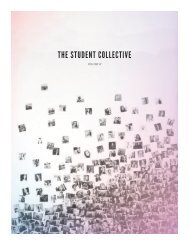The Student Collective Volume VII Issue I
- No tags were found...
Create successful ePaper yourself
Turn your PDF publications into a flip-book with our unique Google optimized e-Paper software.
Story portraits
The Student Collective 15
Bryce Coefield
What does the phrase “One Body, Many Parts” mean to you, and how do you live it out in
your life or see it in our community?
To me this phrase signifies the unity and commonalities we share in our humanity and, for those of faith,
the oneness we have in Christ. This oneness is held in beautiful tension with the unique image of God in
all of us and the diverse ways in which God works in us and through us. I feel fortunate to work, and live
in communities where my identity in Christ is shared among most of the folks I come in contact with.
It really is a privilege in the truest sense to have my personal, spiritual, and professional life integrated
in ways that allow me to strive towards what Parker Palmer describes as an undivided life. In short, the
“one body” is seen and felt on a regular basis. For me—and I believe, for our community—this means that
consistent movement towards recognizing, celebrating and empowering the “many parts” is the challenge
and invitation from God.
What does it look like to love people who are different?
This is a HUGE question! When you find the answer please let me know. I think there are multiple things
that make this question challenging. This first thing that comes to mind is the idea of difference. One of
my favorite books is from Sesame Street. It’s called “We’re Different, We’re the Same,” and it came out in
the early nineties when I was learning to read. This book comes
to mind because I have found that communities tend to overly
emphasize either difference or sameness. I believe that our
capacity to love people who are “different” is predicated
on
our ability to sit in that tension between our differences
and
commonalities.
In spaces like George Fox for example, I think we lean more
towards sameness. My work at Fox requires me to
have difficult conversations about race, ethnicity, and
ultimately how these identities play a role in our lived
experiences. A common response I receive in conversations
is this idea of sameness. It can be heard in comments like
“Aren’t we all Christians?” or “We’re all brothers and sisters
in Christ,” or “We’re all the human race.” Now, each of these
statements hold aspects of truth! However, what I’ve found is
that these statements tend to either diminish or outright dismiss
the significance of race and ethnicity in our lives. I don’t think
folks do this maliciously or even consciously. I think we’ve all
seen poor, and dangerous examples of systems using
difference to justify the exploitation of others,
and we hope to do differently. Denying
difference is not the answer though. I
would argue God, made, celebrates,
and empowers difference. There is a lot
that goes into loving people who are
different, but we can’t love difference if
we don’t acknowledge difference first.










